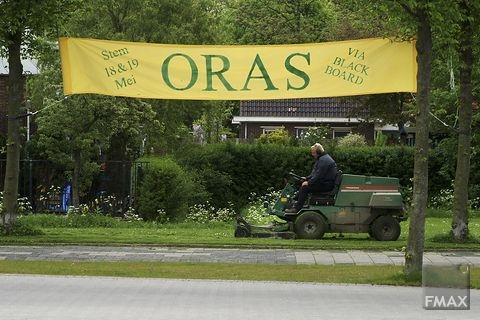The recent TU Delft Student Council elections left many international students feeling perplexed and excluded. Last week, TU Delft’s campus was abuzz with student elections that featured some intense campaigns from the contesting parties, Oras and Lijst Beta, both of which offered alluring promises for making student life in Delft better.
While one often heard Dutch students debating about the contesting parties during breaks, the fact was that not many international students joined in these conversations. Consequently, we interviewed a range of international students to gauge their views about the Student Council (SC) elections.
Most international students held a common opinion that not enough importance was given to their problems on the student parties’ agendas. Bassem Zaroor, a second-year MSc student from Lebanon, voiced the popular thought: “As an international student, I feel the election isn’t for us; it’s more for the local TU students.” And he wasn’t alone in feeling left out.
“The campaigns don’t really address any issues that concern international students. There’s no reason for me to say, ‘let me vote for this particular person’. Also, the campaign is predominately in Dutch, which isn’t a very good start,” added Arturo Orjuela, a first-year MSC student from Colombia.
Some students also felt that not enough effort was made to reach out to international students, with some even surmising that the parties probably don’t want international student votes. Vivian Gkerou, a first-year Greek MSc student, elaborated: “Those involved weren’t clear enough, for example, if they were connected to political parties or not. In addition, they direct their topics and goals more to Dutch BSc students.”
International students are looking to find someone who can help them with the basic problems they face. Francis Ndonga, a third-year aerospace engineering student from Kenya, lists some topics that would catch the attention of international students. “The main issues plaguing international students are fee increments – 40% increase starting this September; difficulties in earning money as international students; faculty jobs; and ample representation in student bodies. Unless a candidate comes forward and states that he or she will address these issues, these elections will always be just another event that we, as international students, will generally tend to ignore.”
While many international students refrained from voting, not all had lost hope in the current contestants. Karthikeyan Ganesan, a second-year MSc student from India, didn’t vote last year but decided to do his part this time: “I want more representation for international students in the Student Council. I came to know about the goals of individual candidates and voted for the one who I thought would take the problems of international students to the TU’s Executive Board.”
Perhaps, a solution to this general apathy would be to form a separate international students’ political party? “No,” opines another voter, Olga Motsyk, a fifth-year aerospace student and Delta columnist. “International students are just 10% of TU Delft’s population, and unfortunately not as interested in university politics as their Dutch colleagues, so the party simply wouldn’t get much support.” She further suggests that international student representation at a proportional rate in the current parties would prove to be more effective, as they could get elected and then serve the international community.
On this front, Oras had one international student, Jonathan Mugerwa, on their party list at no.26 this year. Lijst Beta, meanwhile, couldn’t find an international student interested in the job. Mugerwa, who is also chairman of the Delft International Student Society (Diss), doesn’t find that surprising.
“It’s a major sacrifice, not only academically but also financially,” he says. “And at €12,500 per year for tuition, don’t expect to see any internationals in those positions any time soon.” Mugerwa insists however that more initiatives should be taken to reach out to the international students, because the Student Council is the only student body that can legally speak up for students on the TU’s Executive Board level.
Die opmerkelijke bevindingen publiceerden onderzoekers dr.ir. Michiel Makkee en dr. Malleswara Rao (beiden werkzaam bij catalysis engineering, Technische Natuurwetenschappen) onlangs in het vaktijdschrift ChemSusChem (editie 19 juli 2010).
Het ‘kraken’ van plantaardige oliën in bestaande raffinaderijen – het verbreken van lange koolstofketens door verhitting onder invloed van een katalysator – is volgens de auteurs de meest praktische manier om brandstoffen zoals benzine en diesel uit plantaardige grondstoffen te winnen .
Andere processen zoals het veresteren van vetten voor biodieselproductie, het vergisten van suikers tot ethanol als alternatief voor benzine of de pyrolyse (ontleden door verhitting) van houtresten tot een zeer matige kwaliteit diesel zijn volgens de auteurs minder economisch aantrekkelijk. Elk van die processen heeft volgens hen zijn eigen nadelen waardoor het kraken er het best voor staat.
De onderzoekers hebben samen met een Spaanse collega van de universiteit Rey Juan Carlos in Madrid naar manieren gezocht om het kraken van plantaardige olie te verbeteren. Dat ging in een doorgaand FCC proces, (fluid catalytic cracking) bij 525 graden Celsius en 1,1 atmosfeer. Dat zijn de gebruikelijke procesomstandigheden in een aardolieraffinaderij .
De hoogste omzetting van koolzaadolie in benzine (41 gewichtsprocent) bereikten ze door toevoeging van waterstof en nikkel aan de standaard toegepaste katalysator Ecat. Dat is een derde meer dan bij gebruik van Ecat alleen (31 procent).
Bijkomend voordeel is volgens Makkee dat koolzaadolie heel goed samen te kraken is met zware en met metaal vervuilde aardolie. Immers, de metaalsporen in de olie, vaak nikkel, bevorderen het kraken van de plantaardige olie en voorkomen dat er extra metalen aan de katalysator toegevoegd moeten worden.
“Ontwerpers van biobrandstoffenprocessen zouden er goed aan doen om rekening te houden met de voordelen van het bijmengen van plantaardige en dierlijke aan zware fossiele olie in de bestaande olieraffinaderij infrastructuur als een alternatieve procesoptie”, aldus de auteurs.
T. V. Malleswara Rao, M. Milagrosa Clavero, Michiel Makkee: Effective Gasoline Production Strategies by Catalytic Cracking of Rapeseed Vegetable Oil in Refinery Conditions, Article first published online: 22 JUN 2010, DOI: 10.1002/cssc.201000128



Comments are closed.